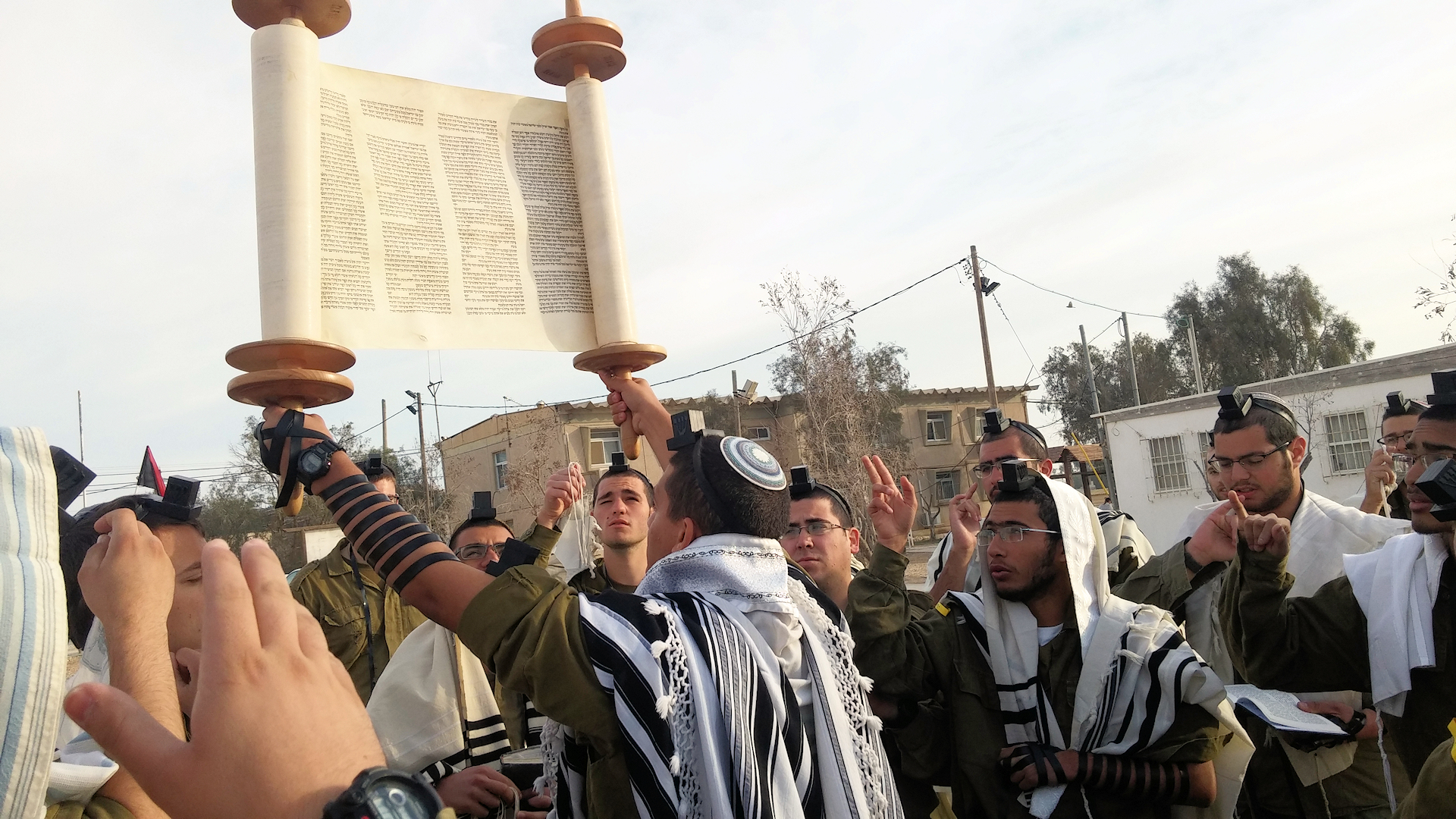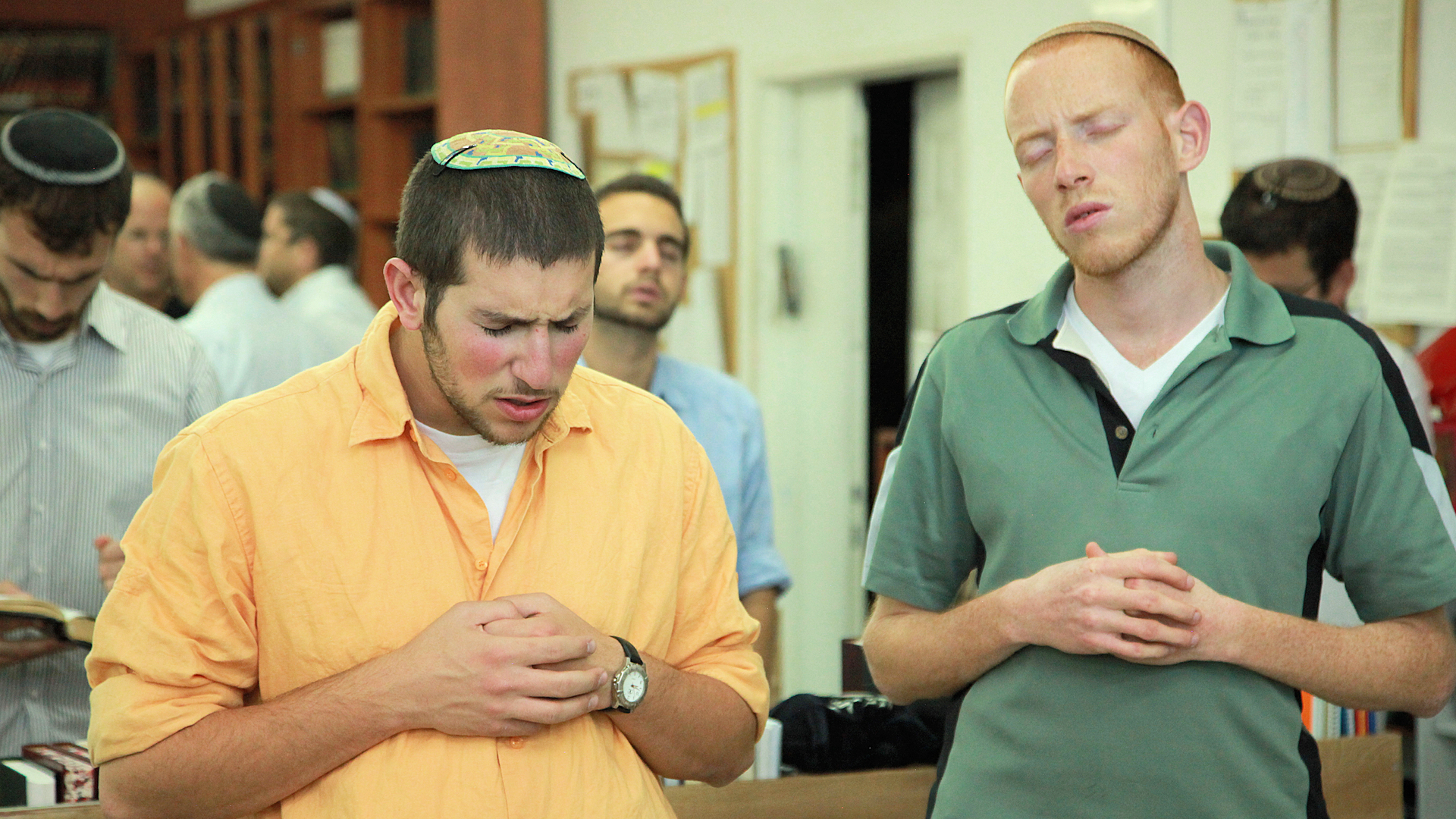The story of the great victory in the exodus from Egypt
Parsha and its realization - Parshat Metzora - Shabat Ha-Gadol and the war of the 'Iron Swords' 5784
Rabbi Eliezer Haim Shenvald
In memory of my brother Sergeant Meir Shenvald HY”D, whose 29th Yahrzeit falls this week.
Dedicated to the IDF soldiers' success, to safeguard them lest any harm come to them, to the healing of all the wounded and the return of the abducted.
בְּכָל דּוֹר וָדוֹר חַיָּב אָדָם לִרְאוֹת אֶת עַצְמוֹ כְּאִלּוּ הוּא יָצָא מִמִּצְרַיִם
"In each and every generation, a person is obligated to see himself as if he left Egypt", does the story of the exodus from Egypt have a meaning nowadays, when we are in the middle of a multi-arena existential war?
We want to ask: What is 'Exodus from Egypt' more alike? A group of slaves who manage to escape from their prison facility, or to a 'nation' who defeats their bitter enemy, who was enslaved to them for many years, and is freed with a military victory parade, armed with weapons that they looted from their enemies?
The apparent meaning of the text points to the second option!
וַחֲמֻשִׁ֛ים עָל֥וּ בְנֵי־יִשְׂרָאֵ֖ל מֵאֶ֥רֶץ מִצְרָֽיִם׃
“And the Children of Israel went up armed from the land of Egypt”. (Shmot 13:18)
"The word חמשים means provided with weapons. (Rashi ibid). The way they went out was like an army prepared for battle: והיו חלוצים כמו היוצאים למלחמה
“Therefore, they were armed, as are people who go out to war”. (Ramban ibid)
As mentioned,
כִּי בְּעֶצֶם הַיּוֹם הַזֶּה הוֹצֵאתִי אֶת צִבְאוֹתֵיכֶם מֵאֶרֶץ מִצְרָיִם
“…for on this very day I brought your hosts out of the land of Egypt…” (Shmot 12:17).
They went out 'armed' with a perfect arsenal of the 'five' types of weapons at that time:
כתיב (שמות יג) וחמושים עלו בני ישראל מארץ מצרים. מלמד שהיו מזוינים בחמשה עשר מיני זיין.
“It is written: Armed did the Children of Israel leave the Land of Egypt. This teaches that they were armed with (fifteen) [five] kinds of arms.” (Jerusalem Talmud Shabbat 6:4:2)
Carrying all types of weapons at that time allowed them to deal with the battles they might encounter along the way. The weapons were taken from the Egyptians when they came to borrow their utensils ('Da’at Mikra' Shmot 13:18).
And how did they get out?
ויש אומרים (ראב"ע) שספר הכתוב שיצאו ביד רמה וחשבו להיות גאולים, ולא הלכו כדמות עבדים בורחים:
“Some scholars say that Scripture is relating that they went out with a high hand, deeming themselves redeemed from bondage, and they did not leave like slaves escaping [from their master].” (Ramban ibid)
The departure from Egypt with a "Yad Rama" -upraised hand- was like a military victory march, armed, the troops marched in an orderly manner, in a pentagonal formation, and their flag was hoisted at the head of the marchers:
"והרצון בזה שנזדרזו כמלך ערוך למלחמה. ויצאו כדמות מלכים בטכסיסי מלוכה "ביד רמה", שזה רמז שיצאו בדגל פרושה לעיני כל רואה. וכו'. "וזהו ובני ישראל יוצאים ביד רמה" (שמות יד ח), ובנס פרושֹה ממש. וכו'. ולכן אמר בכאן "וחמושים עלו בני ישראל" - כדרך כל מחנה שיש לו ד' משמרות לד' רוחות, והמלך או השר באמצע. וכו'. ולכן משה רבם ומלכם סדרם כסדר מחנות ההולכים למלחמה לד' רוחות העולם, והמלך והזקנים באמצע"
"They were ready to go to war and die in the desert and not go back to Egypt. This desire was the same as a king prepared for war. And they came out like kings in royal rituals "with a raised hand", which is a hint that they went out with a spread-out flag for all to see…
…וּבְנֵ֣י יִשְׂרָאֵ֔ל יֹצְאִ֖ים בְּיָ֥ד רָמָֽה “…but the Children of Israel were going out with an upraised hand”. (Shmot 14:8) and there was a real miracle…
That is the reason it says here, “Armed did the Children of Israel leave the Land of Egypt '', as is the way of every camp that has 4 guards in the 4 cardinal points, and the king or the minister in the middle… And so Moshe arranged the camp, like the order of those going to war to the different cardinal points of the world, and the king and the elders in the middle''. (Tzror HaMor on Torah Shmot 13:17).
We find in the Sages and the commentators that the story of the exodus from its beginning was in a war format, with G-d’s help, against Egypt.
In the beginning there were the ten plagues - the 'fire plan' and 'preliminary blows' that damaged the infrastructure and the Egyptians and exhausted them:
בטכסיס בשר ודם הביא הקב"ה עליהם את המכות, מלך בשר ודם כשהמדינה מורדת עליו מהו עושה משלח לגיונות והן מקיפין עליה, בתחילה הוא סוכר אמת המים שלהם אם חוזרין מוטב ואם לאו הוא מורה בהן חצים … זורק בהן נפט… מגרה בהן לגיונות ואוכלוסים הרבה... אוסר אותן בבית האסורין... הורג הגדולים שבהם, כך הקב"ה בא על מצרים בטכסיס של מלכים בתחילה סכר אמת המים שלהן שנאמר ויהפוך לדם יאוריהם...
"In a flesh-and-blood order, G-d brought the plagues upon them. A king of flesh and blood when the country rebels against him, what does he do? He sends legions and surrounds them. First, he dams their aqueduct; if they return, good and if not he points arrows at them, etc. throws fuel at them... imprisons them... kills the biggest of them. This is how the Almighty came upon Egypt in the form of kings. At first, their aqueduct was damed, as it is said: וַיַּהֲפֹ֣ךְ לְ֭דָם יְאֹרֵיהֶ֑ם “He turned their rivers into blood.” (Yalkut Shimoni on Torah 182)
The second stage – Rosh Chodesh Nisan, commanding the people of Israel to get involved in the war:
דַּבְּרוּ אֶל כׇּל עֲדַת יִשְׂרָאֵל לֵאמֹר בֶּעָשֹׂר לַחֹדֶשׁ הַזֶּה וְיִקְחוּ לָהֶם אִישׁ שֶׂה לְבֵית אָבֹת …וְהָיָה לָכֶם לְמִשְׁמֶרֶת עַד אַרְבָּעָה עָשָׂר יוֹם לַחֹדֶשׁ הַזֶּה וְשָׁחֲטוּ אֹתוֹ... וְלָקְחוּ מִן הַדָּם וְנָתְנוּ עַל שְׁתֵּי הַמְּזוּזֹת וְעַל הַמַּשְׁקוֹף ... וְאָכְלוּ אֶת הַבָּשָׂר בַּלַּיְלָה הַזֶּה...
“Speak to the entire congregation of Israel, saying, 'On the tenth of this month each man shall take a lamb for a father's house… It shall be in your safekeeping until the fourteenth day of this month, and the whole assembly of the congregation of Israel will slaughter it … They shall take from the blood and put it on the two doorposts and the lintel… They shall eat the flesh on that night…” (Shmot 12:3-8)
The commandment to take the lamb on the 'tenth of the month' – Shabat Ha-Gadol, represented the great change of consciousness, from an enslaved nation who is afraid to stand before their enslaver, to a victorious nation going out to freedom, straightening up, standing up for war, taking their enslaver’s God to be slaughtered and not being afraid:
שבת שלפני הפסח קורין אותו שבת הגדול והטעם לפי שנעשה בו נס גדול שפסח מצרים מקחו בעשור … ונמצא שי' בחדש היה שבת ולקחו להם כל אחד שה לפסחו וקשר אותו בכרעי מטתו ושאלום המצריים למה זה לכם והשיבו לשחטו לשם פסח במצות השם עלינו והיו שיניהם קהות על ששוחטין את אלהיהן ולא היו רשאין לומר להם דבר ועל שם אותו הנס קורין אותו שבת הגדול:
“The Shabat before Pesach is called "Shabat Ha-Gadol" (The Great Shabat). And the reason is because a miracle occurred during the Exodus from Egypt. On the 10th [they took a sheep] … And the year that the Exodus took place was on a Thursday as we see in Seder Olam, and therefore the "10th of the month" was Shabat, and [on that Shabat] every Jew took a sheep as a Paschal offering and tied it to their bedposts. And the Egyptians asked them "Why is this so [why do you have a sheep (the Egyptian god) tied to your bed]?" And they responded: "To slaughter for a Pesach offering for Hashem." And they got upset that they were going to slaughter their gods, but they could not say anything due to the miracle. And thus, it is called Shabat Ha-Gadol.” (Tur Orach Chaim 431)
The greatness was of the people of Israel:
"מפני מה יחסו וקראו לזה הנס 'גדול' יותר משאר נסים, וכי לא היו נסים גדולים יותר מזה הנס? והא נס דקריעת ים סוף ושאר נסים שעשה השי"ת עם עמו ישראל היו יותר גדולים מזה הנס? ולזה קראו אותו נס 'גדול', שנעשה ב'גדלות השכל'. שלא היה להם שום מורא ופחד מן המצריים אעפ"י שהיו רוצין לשחוט את אלהיהם" ("קדושת לוי" – יתרו, העקידה ל"ח).
"Why is this miracle considered greater than other miracles? Was the Splitting of the Sea not a greater miracle? What about other miracles that Hashem made for the Israelites? This is called the 'great' miracle because it was done with 'greatness of mind'. They did not fear nor dread the Egyptians even though they wanted to slaughter their gods'' ("Kedushat Levi'' - Yitro, Ha'akida 38).
The third stage on Seder night, they were commanded to eat the Pesach, when they were prepared and armed and ready to go to battle:
"וְכָכָה תֹּאכְלוּ אֹתוֹ מָתְנֵיכֶם חֲגֻרִים, נַעֲלֵיכֶם בְּרַגְלֵיכֶם וּמַקֶּלְכֶם בְּיֶדְכֶם...
“Thus shall you eat it: your hips belted, your sandals on your feet, and your staffs in your hand…” (Shmot 12:11)
In several places in the Bible we find a belt in connection with a sword:
There are swords that will be girded with a belt, as it is said about Yoav (II Samuel 20:8)
וְיוֹאָ֞ב ...[וְעָלָ֞יו] חֲג֥וֹר חֶ֙רֶב֙ מְצֻמֶּ֤דֶת עַל־מָתְנָיו֙ בְּתַעְרָ֔הּ ...
“Yoav was wearing his military dress, with his sword girded over it and fastened around his waist in its sheath…”
and some will gird them on the thigh, etc
חֲגֽוֹר־חַרְבְּךָ֣ עַל יָרֵ֣ךְ גִּבּ֑וֹר “Gird your sword upon your thigh, O hero…” )Psalms 45:4)
(Radak)
The fourth stage - the departure from Egypt with a "Yad Rama" -upraised hand" in the victory parade over Pharaoh.
And in the fifth stage - the decisive confrontation in the desert, on the Red Sea, and the sinking of the Egyptians.
According to the Sages, Pharaoh was afraid of this war from the beginning of his reign, and therefore he made decrees that would weaken and diminish the people of Israel:
הָ֥בָה נִֽתְחַכְּמָ֖ה ל֑וֹ פֶּן יִרְבֶּ֗ה וְהָיָ֞ה כִּֽי תִקְרֶ֤אנָה מִלְחָמָה֙ וְנוֹסַ֤ף גַּם הוּא֙ עַל שֹׂ֣נְאֵ֔ינוּ וְנִלְחַם בָּ֖נוּ וְעָלָ֥ה מִן הָאָֽרֶץ׃
"Let us deal shrewdly with them, so that they may not increase; otherwise in the event of war they may join our enemies in fighting against us and rise from the ground.” (Shmot 1:10)
"פרעה נתנבא ולא ידע מה נתנבא, שנאמר 'ונלחם בנו ועלה מן הארץ'. נתנבא שעתידים ישראל לעשות עמו מלחמה ולהעלות לשלום את הארץ"
"Pharaoh prophesied and did not know what was being prophesied, as it is said “fighting against us and rising from the ground”. He prophesied that Israel would make war to him…" (Avot de-Rabbi Nathan)
Let us gather on Seder night to tell the story of the victory over Egypt,בַּיָּמִים הָהֵם in those days- and draw from it strength and faith in G-d for victory over our enemies, in our times בִּזְּ֒מַן הַזֶּה.



